Navigating Higher Education with Visual Impairment: A Reflection
VerifiedAdded on 2021/04/24
|6
|1281
|78
Journal and Reflective Writing
AI Summary
This reflective account provides a detailed look into a visually impaired student's experiences and challenges within a higher education setting. The student reflects on their struggles with learning, particularly in lectures and exams, and how they adapted to overcome these difficulties. The account highlights the crucial role of the professor and the university in providing accommodations, such as accessible learning materials, online resources, practical sessions, and extra time for assessments. It also describes the use of assistive technologies like Braille and screen-reading software. The student discusses the impact of these supports on their confidence and academic performance. The reflection further suggests areas where the university could improve its support systems, such as incorporating social development theory and expanding the use of Braille technology. The account concludes with an affirmation of the positive impact of the support received and a call for continued efforts to accommodate students with disabilities. References to relevant literature are included to support the reflection.
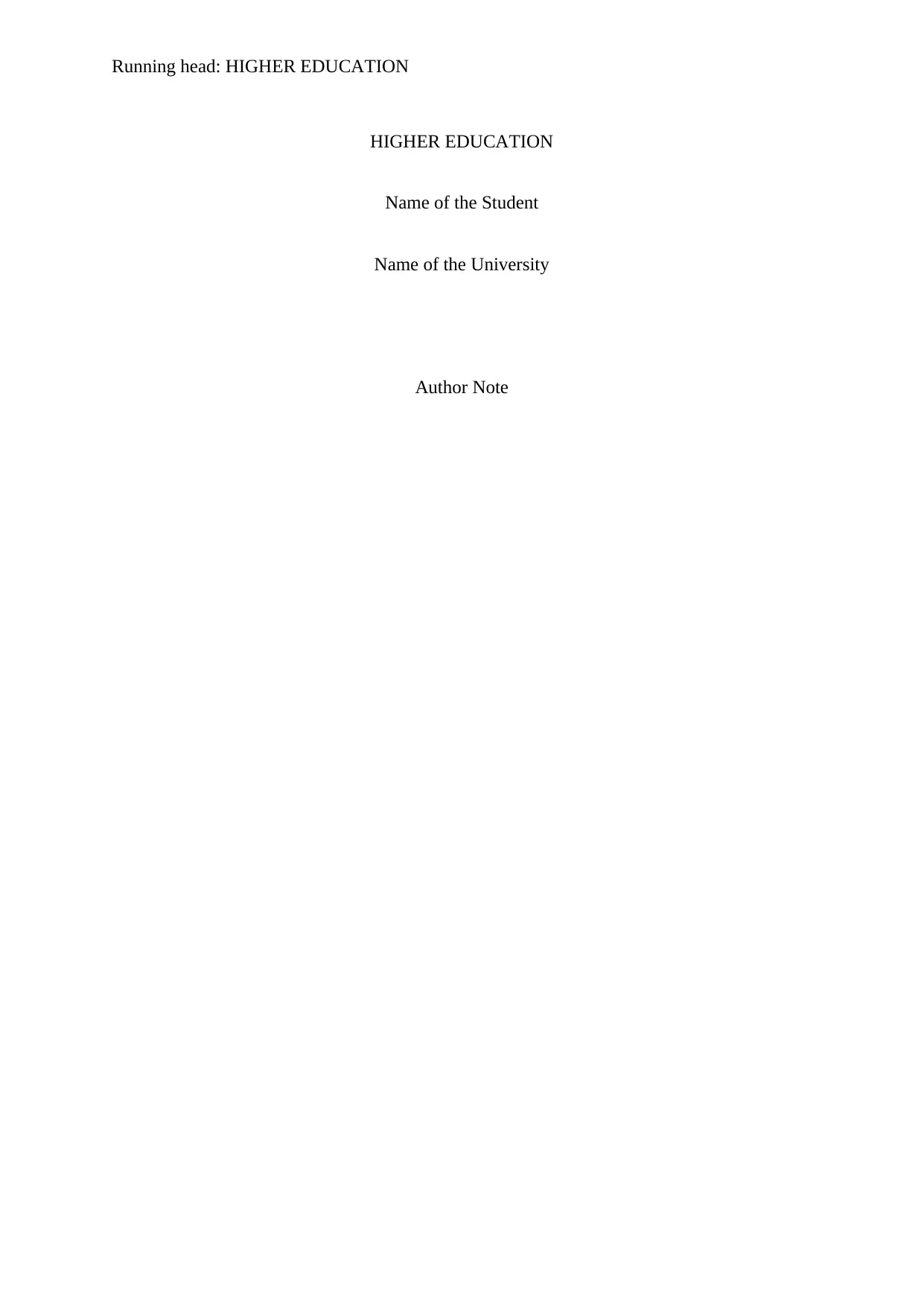
Running head: HIGHER EDUCATION
HIGHER EDUCATION
Name of the Student
Name of the University
Author Note
HIGHER EDUCATION
Name of the Student
Name of the University
Author Note
Paraphrase This Document
Need a fresh take? Get an instant paraphrase of this document with our AI Paraphraser
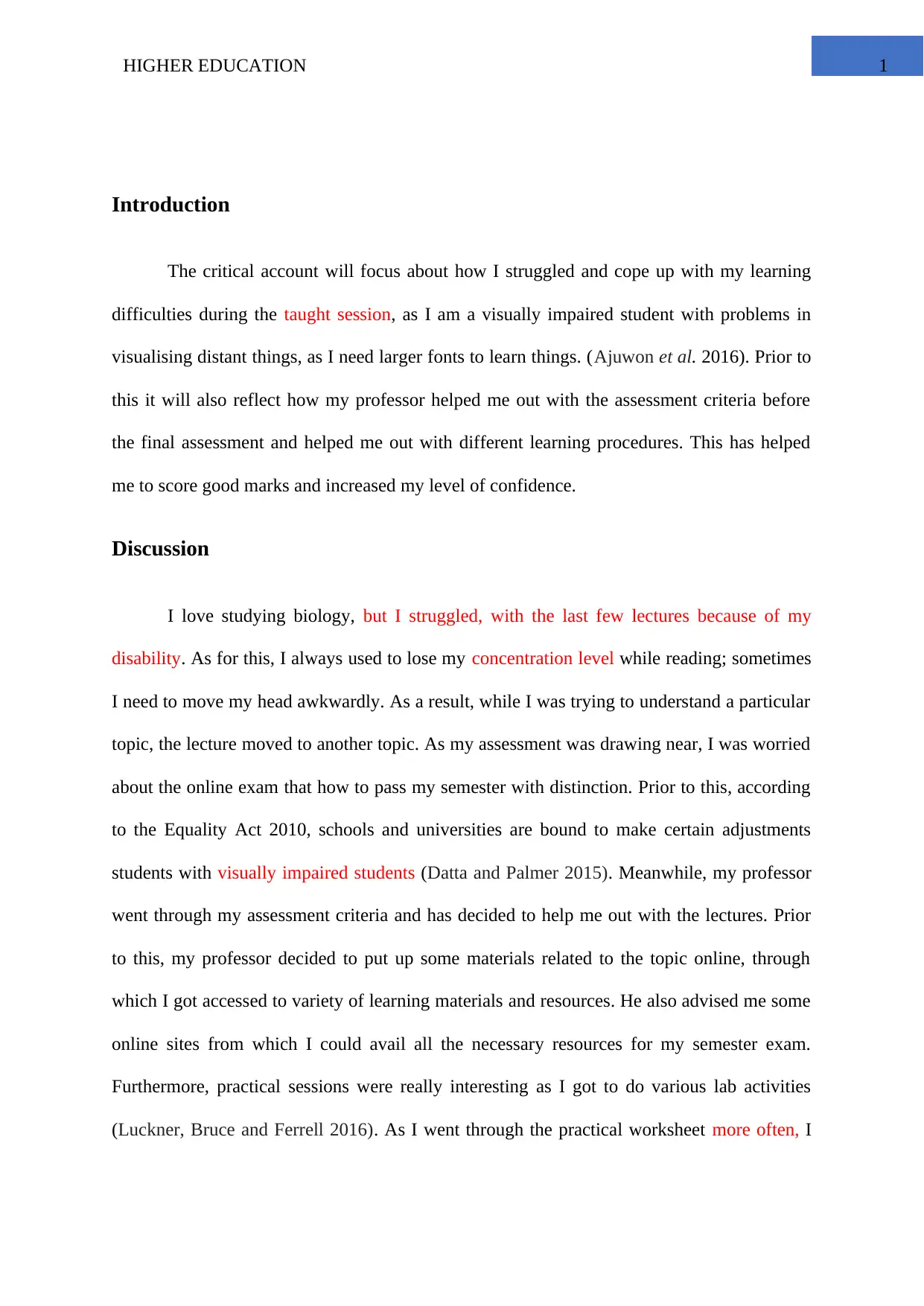
1HIGHER EDUCATION
Introduction
The critical account will focus about how I struggled and cope up with my learning
difficulties during the taught session, as I am a visually impaired student with problems in
visualising distant things, as I need larger fonts to learn things. (Ajuwon et al. 2016). Prior to
this it will also reflect how my professor helped me out with the assessment criteria before
the final assessment and helped me out with different learning procedures. This has helped
me to score good marks and increased my level of confidence.
Discussion
I love studying biology, but I struggled, with the last few lectures because of my
disability. As for this, I always used to lose my concentration level while reading; sometimes
I need to move my head awkwardly. As a result, while I was trying to understand a particular
topic, the lecture moved to another topic. As my assessment was drawing near, I was worried
about the online exam that how to pass my semester with distinction. Prior to this, according
to the Equality Act 2010, schools and universities are bound to make certain adjustments
students with visually impaired students (Datta and Palmer 2015). Meanwhile, my professor
went through my assessment criteria and has decided to help me out with the lectures. Prior
to this, my professor decided to put up some materials related to the topic online, through
which I got accessed to variety of learning materials and resources. He also advised me some
online sites from which I could avail all the necessary resources for my semester exam.
Furthermore, practical sessions were really interesting as I got to do various lab activities
(Luckner, Bruce and Ferrell 2016). As I went through the practical worksheet more often, I
Introduction
The critical account will focus about how I struggled and cope up with my learning
difficulties during the taught session, as I am a visually impaired student with problems in
visualising distant things, as I need larger fonts to learn things. (Ajuwon et al. 2016). Prior to
this it will also reflect how my professor helped me out with the assessment criteria before
the final assessment and helped me out with different learning procedures. This has helped
me to score good marks and increased my level of confidence.
Discussion
I love studying biology, but I struggled, with the last few lectures because of my
disability. As for this, I always used to lose my concentration level while reading; sometimes
I need to move my head awkwardly. As a result, while I was trying to understand a particular
topic, the lecture moved to another topic. As my assessment was drawing near, I was worried
about the online exam that how to pass my semester with distinction. Prior to this, according
to the Equality Act 2010, schools and universities are bound to make certain adjustments
students with visually impaired students (Datta and Palmer 2015). Meanwhile, my professor
went through my assessment criteria and has decided to help me out with the lectures. Prior
to this, my professor decided to put up some materials related to the topic online, through
which I got accessed to variety of learning materials and resources. He also advised me some
online sites from which I could avail all the necessary resources for my semester exam.
Furthermore, practical sessions were really interesting as I got to do various lab activities
(Luckner, Bruce and Ferrell 2016). As I went through the practical worksheet more often, I
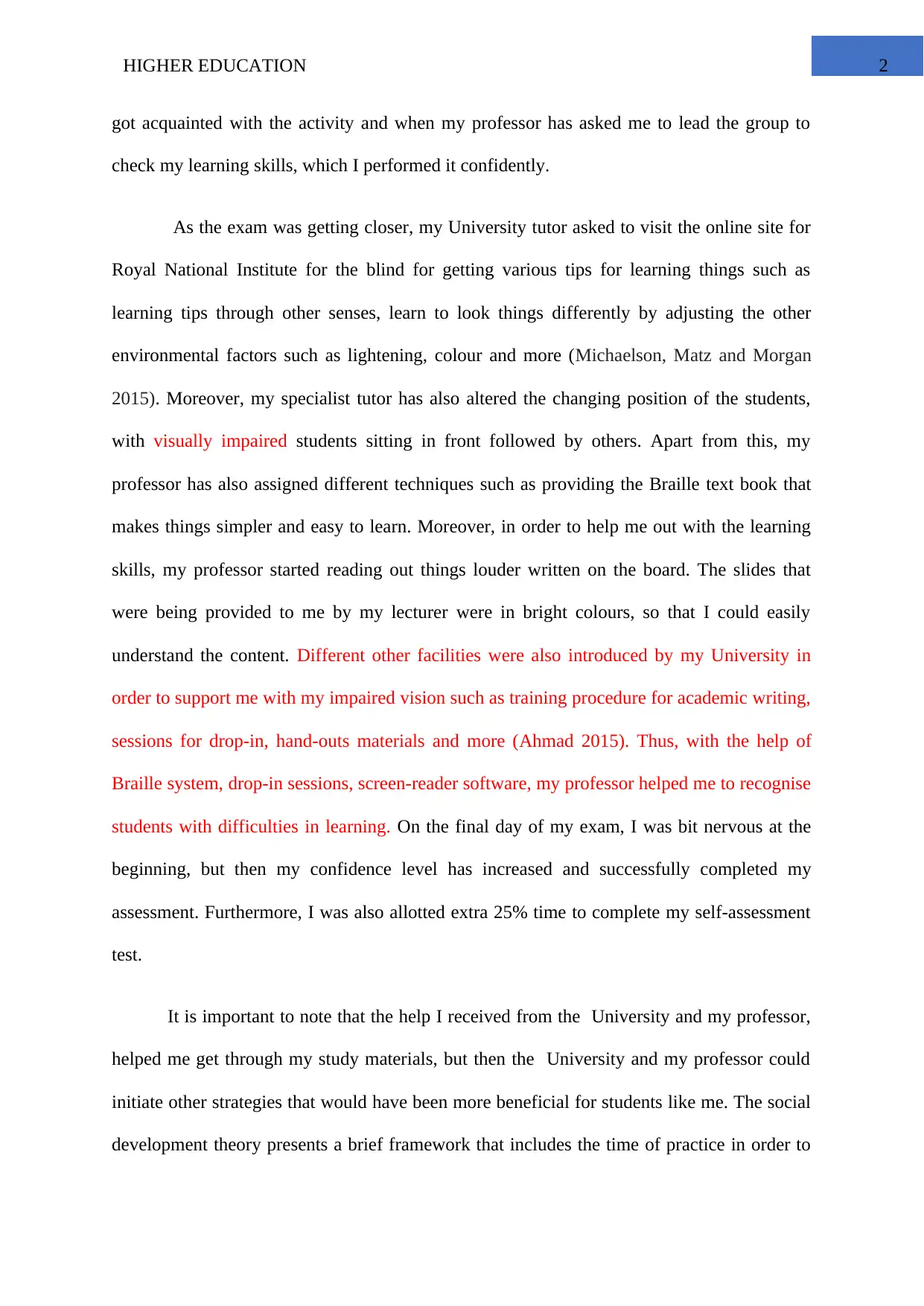
2HIGHER EDUCATION
got acquainted with the activity and when my professor has asked me to lead the group to
check my learning skills, which I performed it confidently.
As the exam was getting closer, my University tutor asked to visit the online site for
Royal National Institute for the blind for getting various tips for learning things such as
learning tips through other senses, learn to look things differently by adjusting the other
environmental factors such as lightening, colour and more (Michaelson, Matz and Morgan
2015). Moreover, my specialist tutor has also altered the changing position of the students,
with visually impaired students sitting in front followed by others. Apart from this, my
professor has also assigned different techniques such as providing the Braille text book that
makes things simpler and easy to learn. Moreover, in order to help me out with the learning
skills, my professor started reading out things louder written on the board. The slides that
were being provided to me by my lecturer were in bright colours, so that I could easily
understand the content. Different other facilities were also introduced by my University in
order to support me with my impaired vision such as training procedure for academic writing,
sessions for drop-in, hand-outs materials and more (Ahmad 2015). Thus, with the help of
Braille system, drop-in sessions, screen-reader software, my professor helped me to recognise
students with difficulties in learning. On the final day of my exam, I was bit nervous at the
beginning, but then my confidence level has increased and successfully completed my
assessment. Furthermore, I was also allotted extra 25% time to complete my self-assessment
test.
It is important to note that the help I received from the University and my professor,
helped me get through my study materials, but then the University and my professor could
initiate other strategies that would have been more beneficial for students like me. The social
development theory presents a brief framework that includes the time of practice in order to
got acquainted with the activity and when my professor has asked me to lead the group to
check my learning skills, which I performed it confidently.
As the exam was getting closer, my University tutor asked to visit the online site for
Royal National Institute for the blind for getting various tips for learning things such as
learning tips through other senses, learn to look things differently by adjusting the other
environmental factors such as lightening, colour and more (Michaelson, Matz and Morgan
2015). Moreover, my specialist tutor has also altered the changing position of the students,
with visually impaired students sitting in front followed by others. Apart from this, my
professor has also assigned different techniques such as providing the Braille text book that
makes things simpler and easy to learn. Moreover, in order to help me out with the learning
skills, my professor started reading out things louder written on the board. The slides that
were being provided to me by my lecturer were in bright colours, so that I could easily
understand the content. Different other facilities were also introduced by my University in
order to support me with my impaired vision such as training procedure for academic writing,
sessions for drop-in, hand-outs materials and more (Ahmad 2015). Thus, with the help of
Braille system, drop-in sessions, screen-reader software, my professor helped me to recognise
students with difficulties in learning. On the final day of my exam, I was bit nervous at the
beginning, but then my confidence level has increased and successfully completed my
assessment. Furthermore, I was also allotted extra 25% time to complete my self-assessment
test.
It is important to note that the help I received from the University and my professor,
helped me get through my study materials, but then the University and my professor could
initiate other strategies that would have been more beneficial for students like me. The social
development theory presents a brief framework that includes the time of practice in order to
⊘ This is a preview!⊘
Do you want full access?
Subscribe today to unlock all pages.

Trusted by 1+ million students worldwide
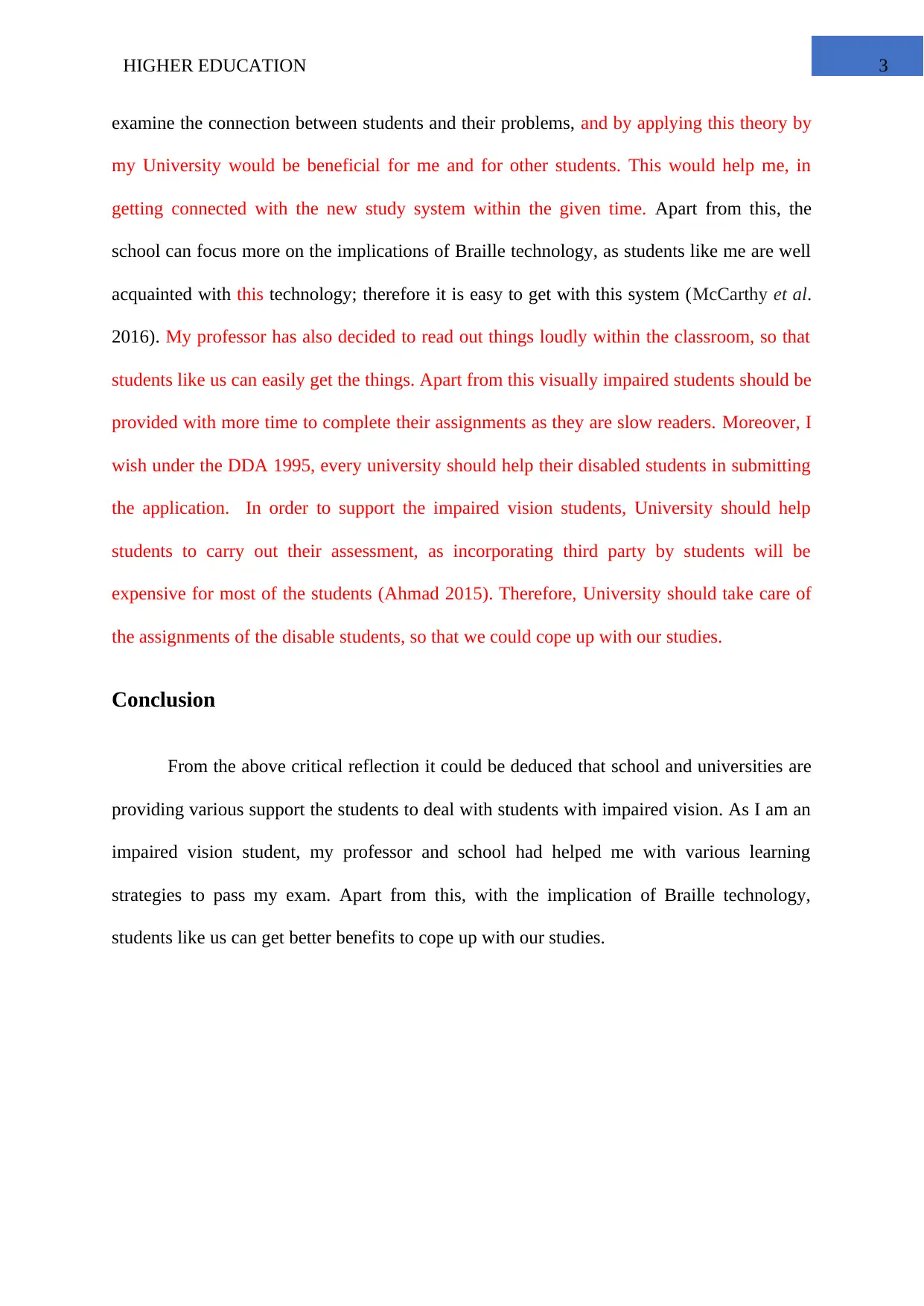
3HIGHER EDUCATION
examine the connection between students and their problems, and by applying this theory by
my University would be beneficial for me and for other students. This would help me, in
getting connected with the new study system within the given time. Apart from this, the
school can focus more on the implications of Braille technology, as students like me are well
acquainted with this technology; therefore it is easy to get with this system (McCarthy et al.
2016). My professor has also decided to read out things loudly within the classroom, so that
students like us can easily get the things. Apart from this visually impaired students should be
provided with more time to complete their assignments as they are slow readers. Moreover, I
wish under the DDA 1995, every university should help their disabled students in submitting
the application. In order to support the impaired vision students, University should help
students to carry out their assessment, as incorporating third party by students will be
expensive for most of the students (Ahmad 2015). Therefore, University should take care of
the assignments of the disable students, so that we could cope up with our studies.
Conclusion
From the above critical reflection it could be deduced that school and universities are
providing various support the students to deal with students with impaired vision. As I am an
impaired vision student, my professor and school had helped me with various learning
strategies to pass my exam. Apart from this, with the implication of Braille technology,
students like us can get better benefits to cope up with our studies.
examine the connection between students and their problems, and by applying this theory by
my University would be beneficial for me and for other students. This would help me, in
getting connected with the new study system within the given time. Apart from this, the
school can focus more on the implications of Braille technology, as students like me are well
acquainted with this technology; therefore it is easy to get with this system (McCarthy et al.
2016). My professor has also decided to read out things loudly within the classroom, so that
students like us can easily get the things. Apart from this visually impaired students should be
provided with more time to complete their assignments as they are slow readers. Moreover, I
wish under the DDA 1995, every university should help their disabled students in submitting
the application. In order to support the impaired vision students, University should help
students to carry out their assessment, as incorporating third party by students will be
expensive for most of the students (Ahmad 2015). Therefore, University should take care of
the assignments of the disable students, so that we could cope up with our studies.
Conclusion
From the above critical reflection it could be deduced that school and universities are
providing various support the students to deal with students with impaired vision. As I am an
impaired vision student, my professor and school had helped me with various learning
strategies to pass my exam. Apart from this, with the implication of Braille technology,
students like us can get better benefits to cope up with our studies.
Paraphrase This Document
Need a fresh take? Get an instant paraphrase of this document with our AI Paraphraser
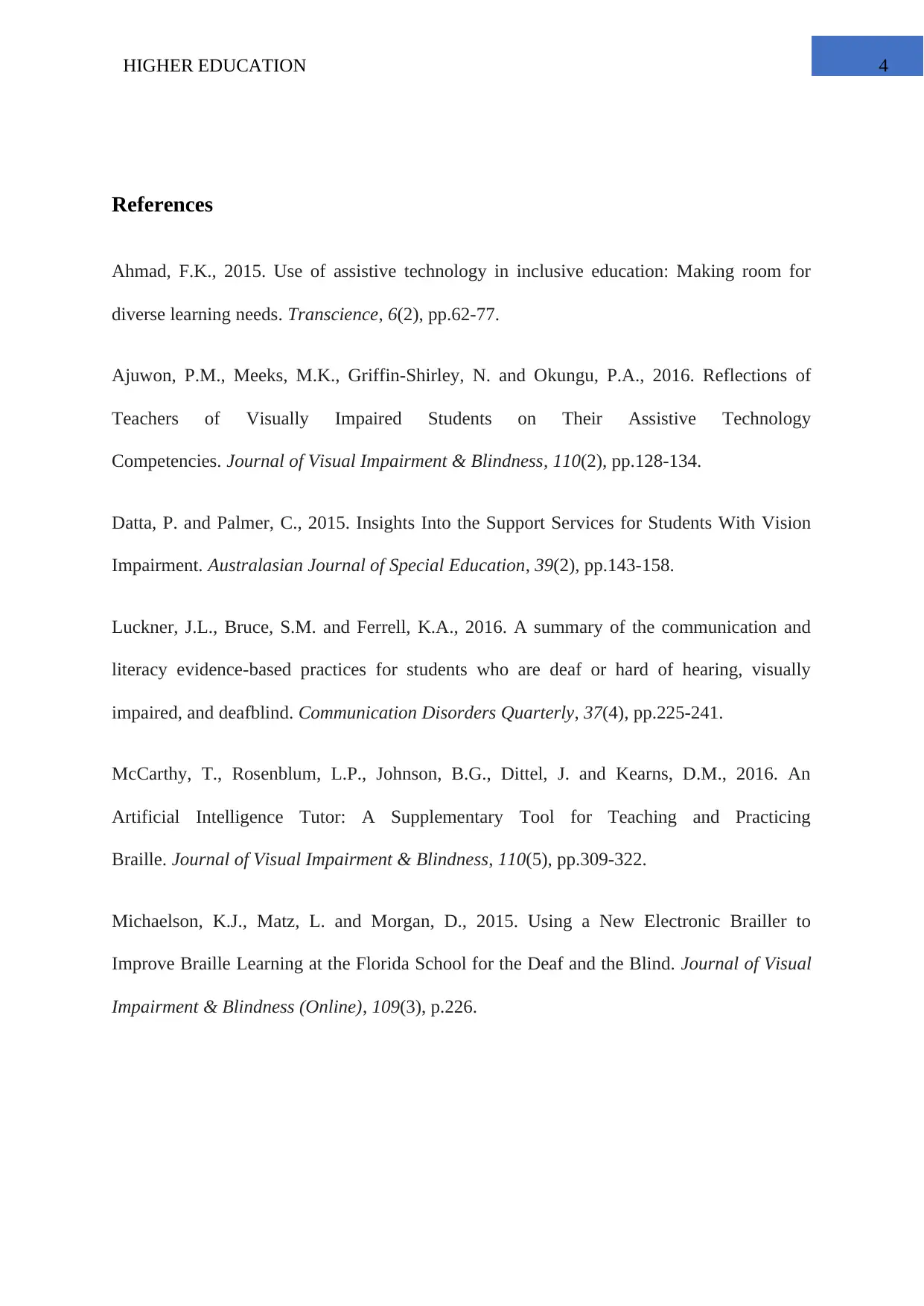
4HIGHER EDUCATION
References
Ahmad, F.K., 2015. Use of assistive technology in inclusive education: Making room for
diverse learning needs. Transcience, 6(2), pp.62-77.
Ajuwon, P.M., Meeks, M.K., Griffin-Shirley, N. and Okungu, P.A., 2016. Reflections of
Teachers of Visually Impaired Students on Their Assistive Technology
Competencies. Journal of Visual Impairment & Blindness, 110(2), pp.128-134.
Datta, P. and Palmer, C., 2015. Insights Into the Support Services for Students With Vision
Impairment. Australasian Journal of Special Education, 39(2), pp.143-158.
Luckner, J.L., Bruce, S.M. and Ferrell, K.A., 2016. A summary of the communication and
literacy evidence-based practices for students who are deaf or hard of hearing, visually
impaired, and deafblind. Communication Disorders Quarterly, 37(4), pp.225-241.
McCarthy, T., Rosenblum, L.P., Johnson, B.G., Dittel, J. and Kearns, D.M., 2016. An
Artificial Intelligence Tutor: A Supplementary Tool for Teaching and Practicing
Braille. Journal of Visual Impairment & Blindness, 110(5), pp.309-322.
Michaelson, K.J., Matz, L. and Morgan, D., 2015. Using a New Electronic Brailler to
Improve Braille Learning at the Florida School for the Deaf and the Blind. Journal of Visual
Impairment & Blindness (Online), 109(3), p.226.
References
Ahmad, F.K., 2015. Use of assistive technology in inclusive education: Making room for
diverse learning needs. Transcience, 6(2), pp.62-77.
Ajuwon, P.M., Meeks, M.K., Griffin-Shirley, N. and Okungu, P.A., 2016. Reflections of
Teachers of Visually Impaired Students on Their Assistive Technology
Competencies. Journal of Visual Impairment & Blindness, 110(2), pp.128-134.
Datta, P. and Palmer, C., 2015. Insights Into the Support Services for Students With Vision
Impairment. Australasian Journal of Special Education, 39(2), pp.143-158.
Luckner, J.L., Bruce, S.M. and Ferrell, K.A., 2016. A summary of the communication and
literacy evidence-based practices for students who are deaf or hard of hearing, visually
impaired, and deafblind. Communication Disorders Quarterly, 37(4), pp.225-241.
McCarthy, T., Rosenblum, L.P., Johnson, B.G., Dittel, J. and Kearns, D.M., 2016. An
Artificial Intelligence Tutor: A Supplementary Tool for Teaching and Practicing
Braille. Journal of Visual Impairment & Blindness, 110(5), pp.309-322.
Michaelson, K.J., Matz, L. and Morgan, D., 2015. Using a New Electronic Brailler to
Improve Braille Learning at the Florida School for the Deaf and the Blind. Journal of Visual
Impairment & Blindness (Online), 109(3), p.226.
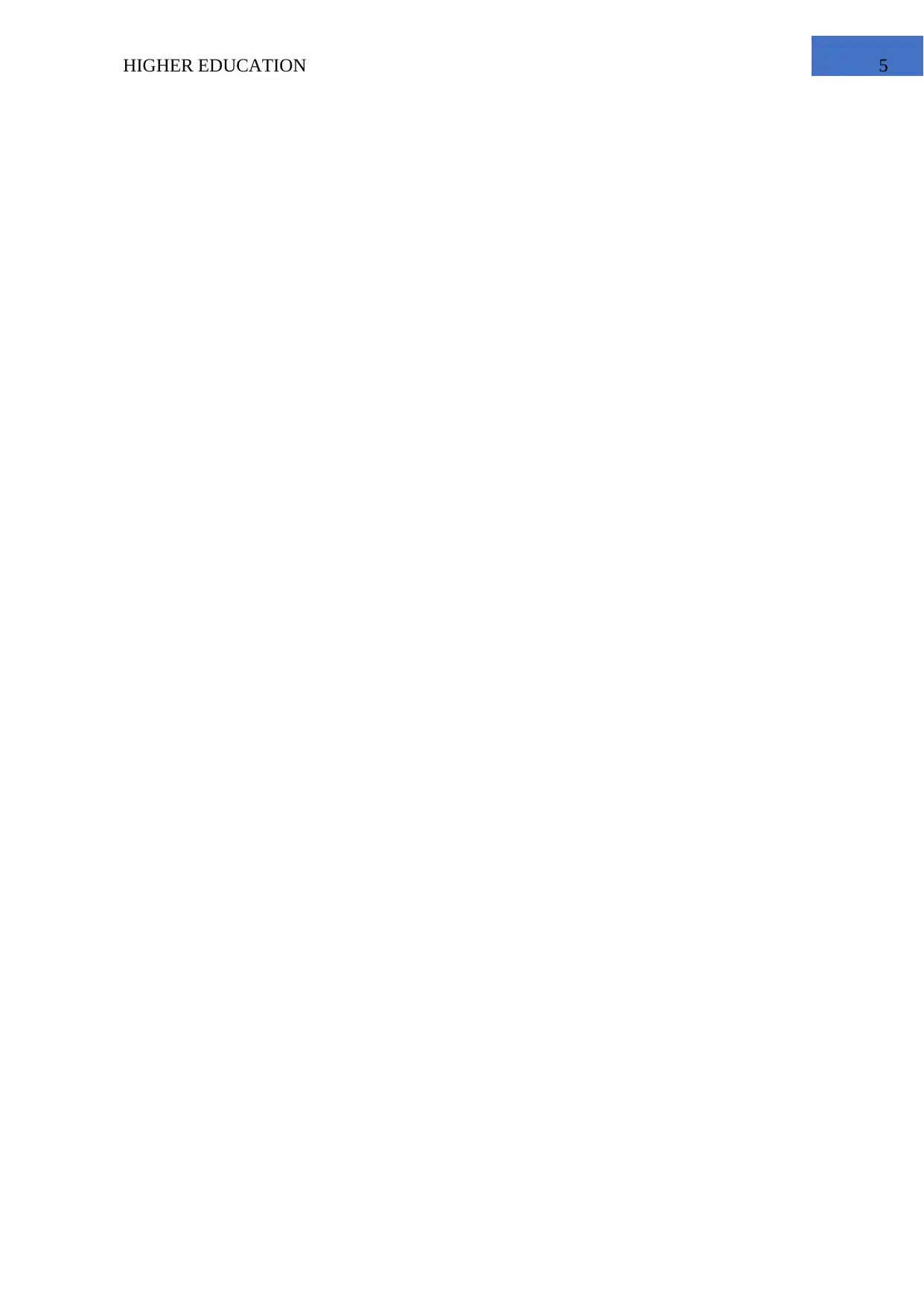
5HIGHER EDUCATION
⊘ This is a preview!⊘
Do you want full access?
Subscribe today to unlock all pages.

Trusted by 1+ million students worldwide
1 out of 6
Related Documents
Your All-in-One AI-Powered Toolkit for Academic Success.
+13062052269
info@desklib.com
Available 24*7 on WhatsApp / Email
![[object Object]](/_next/static/media/star-bottom.7253800d.svg)
Unlock your academic potential
Copyright © 2020–2026 A2Z Services. All Rights Reserved. Developed and managed by ZUCOL.





